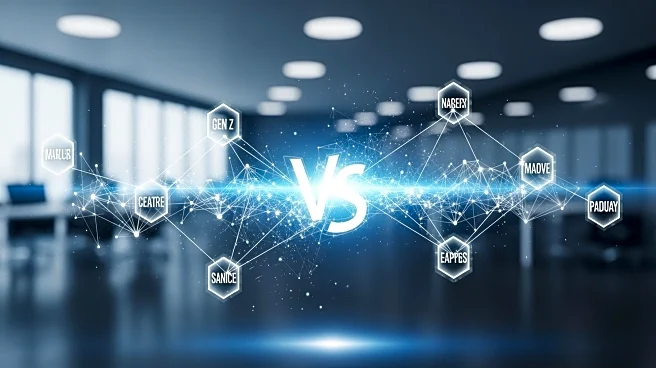What's Happening?
A recent study conducted by Becoming You Labs has revealed a significant disconnect between the values of Gen Z and the expectations of hiring managers across various industries. The study, which involved over 77,000 participants, identified Gen Z's top
values as self-care, authentic self-expression, and helping people. In contrast, employers prioritize achievement, learning, and hard work. This disparity is causing challenges in hiring Gen Z individuals, as only 2% of them share their bosses' priorities. The findings have sparked debate, with Gen Z expressing reluctance to adopt values they associate with older generations, whom they blame for current societal issues. The study highlights the growing frustration among both companies and young job seekers, exacerbated by the threat of AI replacing entry-level jobs.
Why It's Important?
The disconnect between Gen Z's values and employer expectations is significant as it impacts the ability of companies to fill positions with suitable candidates. This generational divide could lead to a shortage of skilled workers, affecting productivity and innovation in industries such as tech, consulting, and banking. As Gen Z prioritizes self-care and authenticity over traditional work values, companies may need to adapt their recruitment strategies and workplace cultures to attract and retain young talent. The situation also underscores the broader societal shift towards valuing personal well-being and ethical considerations over career advancement, which could influence future business practices and policies.
What's Next?
Employers may need to reconsider their approach to hiring and managing Gen Z employees, potentially offering more flexible work environments that align with their values. Companies might also invest in training programs that emphasize personal development alongside professional skills. As the debate continues, there could be increased dialogue between employers and Gen Z to find common ground and address the challenges posed by this generational shift. Additionally, the role of AI in the job market may prompt further discussions on how to balance technological advancements with human-centric work values.
Beyond the Headlines
The clash between Gen Z and employers highlights deeper cultural shifts in the workforce, where traditional notions of success and work ethic are being challenged. This could lead to long-term changes in how companies structure their work environments and define employee roles. The emphasis on self-care and authenticity may also influence corporate social responsibility initiatives, as businesses strive to align with the values of younger generations. Furthermore, the integration of AI and automation in the workplace could redefine job roles, necessitating a reevaluation of what skills are considered valuable.
















